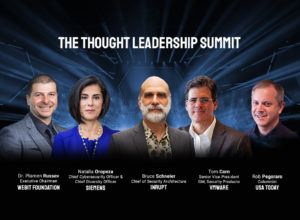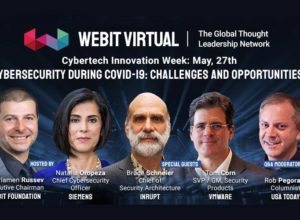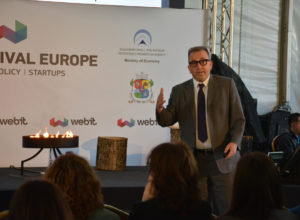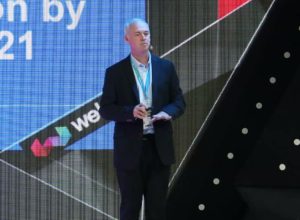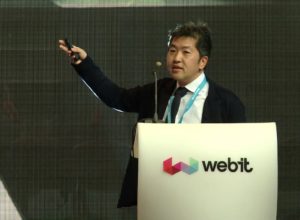What the future holds for the human kind?
Webit Virtual Leading Media Forum hosted a wide range of eye-opening, informative, useful and inspiring discussions during The Future of Work and Education Week which was under the theme: “The future of skills and learning in a post-Covid-19 world”
We all know that education is the future. And that the future belongs to the educated people. But what kind of education and skills do we need in this quickly changing environment and disrupted world in order to be successful, to fulfill ourselves and to use the whole potential that every single human being holds within? Over 8 thousand simultaneous virtual attendees from the Global Webit Community at the live event on Thursday, June 4th, wanted to learn the answer of this question, important for all mankind and the future generations.During The Leading Media Forum we made a deep observation and analysis and of both - the discussion on Tuesday, June 2nd and the most important changes happening lately on the whole Global scene concerning the future of work and education with the help of the special guests including some of world’s leading journalists, writers and forward thinkers:
🌟 Alex Kantrowitz- Senior Technology Reporter at BuzzFeed;Christina Zdanowicz - Senior Producer at CNN; Connie Lee - Reporter/Producer at CGTN; Jared Lindzon -Journalist at Fast Company.
During the panel some important and impactful topics were outlined, including how the education system has been disrupted, how 1.5 billion students are not physically at school right now and the chance that this gives us to reinvent education worldwide, to find new ways to teach things and some new opportunities to work and achieve our own goals and to develop as a society. The host of Webit Virtual and the Executive chairman of Webit, Dr. Plamen Russev emphasized on the importance of looking at every change positively and not putting a lot of negative expectations out there as this might become a self fulfilling prophecy. Jared went even further claiming that such moments of disruption actually provide a perfect opportunity to make some very badly needed changes that have been needed for a long time. That is where the key is, that's where the opportunity is. The pandemic is shaping the future of work and it is bringing it here much faster than it was scheduled Connie foreseen a lot of blending between physical and virtual work in the future providing some statistics, numbers proving that tendency:
-
- Last year more than 60% of companies allowed remote work.
- 20% of companies were already completely remote.
- After the pandemic these numbers spiked and a recent survey had said nearly 75% of CFOs said they want to shift at least 5% of their employees to a remote working model.
- We need to develop an education system that's focused on getting people to think innovatively, getting people to think in a way that makes them take chances and to think more abstractly, not just how to get from point A to point B. -said Alex.
- There's a need for constant innovation, for constant learning. Because what you've learned in school is probably going to be obsolete by the time you graduate.- added Jared, concluding that the hard skills are becoming less significant than the soft skills.- The soft skills that will allow you to adapt, to evolve, and grow over time are much more valuable to employers than just a lot of expertise in one narrow field.
Cybersecurity during Covid-19: Challenges and Opportunities
The Thought Leadership Summit during the Cybertech Week of Webit Virtual
The Thought Leadership Summit on 27 May during the Cybertech Week of Webit Virtual, hosted by Dr. Plamen Russev and Natalia Oropeza, Chief Cybersecurity Officer Siemens brought together more than 10 K simultaneous virtual attendees from the Global Webit Community.
A wide range of impactful and practical discussions were held during the broadcast, which was titled: "Cybersecurity during Covid-19: Challenges and Opportunities". Undoubtedly, a topic that concerns many and plays a crucial role in today's society as well as in shaping the future generations. As special guests in the discussion were invited Bruce Schneider- Chief of Security Architecture at Inrupt and Tom Corn- Senior Vice President / GM , Security Products at VMware.
Tens of organizations, including WHO and others have been warning that we see five to ten fold increase in the cyber security threats. It is reported that 70% of the companies plan to increase their infrastructure and investment in cybersecurity solutions. Having that in mind, we have been involving leading experts to join us and to share with our audience their vision on how to get prepared for all cyber threats, because they can make the digital world kind of unsecure for people who are not ready and responsible enough. Together with them we were discussing how Cybersecurity can be improved and how we can make sure that we, the humans, live a better, more secure and protected and how we can create together the “ new normal”, a better “normal”, based on resilient lifestyle and resilience in general, based on inclusion and collective responsibility.
The person, who is called by Economist the “cybertech guru”and оne of the invited guests during the panel - Bruce Schneider, said that we are all being tricked anyway. Why would we expect that one more app, that is about contact tracing, will be such a big issue if we already have 100 more tracing us every single place we'd go, every single thing we do? Going for the real threads, we can conclude that Covid-19 is escalating a lot of them that we see in the cyber world. But what are the lessons that we all need to learn from this crisis and always keep in mind afterwards?
- I think there are two main lessons, we are teaching everybody. - said Bruce- The easy one is to understand exponential growth. If people knew a little bit more math, we'd have a much better time with this crisis. The second is the value of redundancy. We live in an economic system where pretty much all redundancy is leached out in the name of profit. And that only works when things are going perfectly. If we want to have a system that is robust, that is resilient against all sorts of threats, redundancy is essential. And that costs money. And it doesn't pay in normal times. It is your insurance for crisis times.I think something we can learn in IT, that the whole world is learning about everything, about our food supply, about our cities, about our government, is the value of redundancy. Redundancy isn't inefficient. Redundancy is security. That’s probably the most important lesson.
During the panel other topics were discussed as well, including strategies for dealing with the Covid pandemic and the Post-Covid adaption of the companies, that were represented by the guests and the co-host of Webit Virtual Thought Leadership Summit - Siemens, Inrupt and VMware.
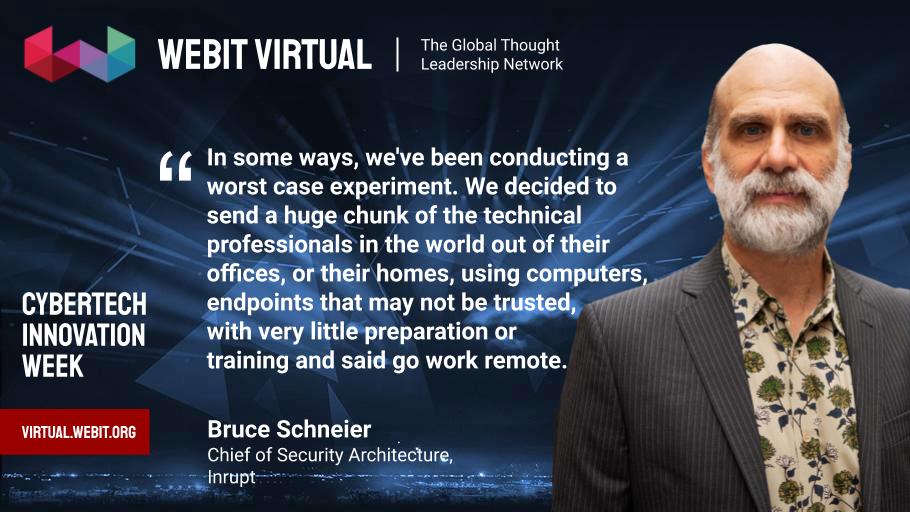
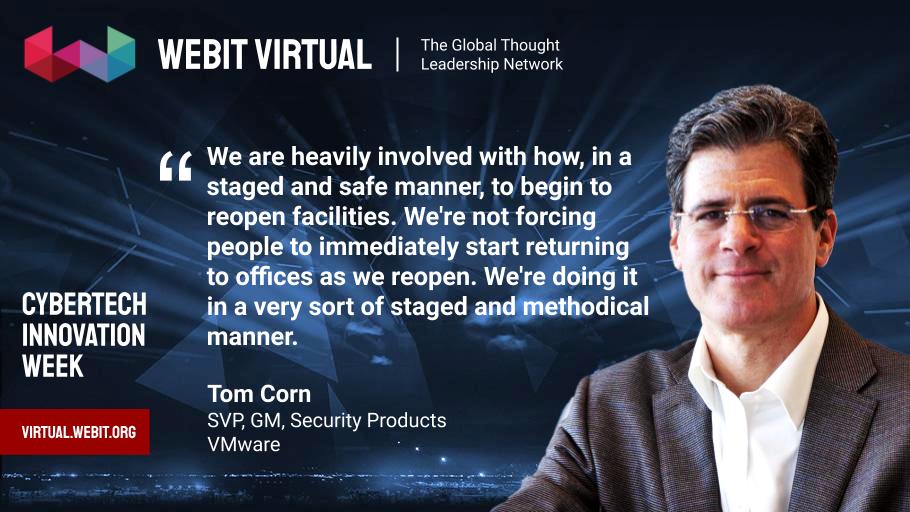 Written by
Teodora Hadjibojeva,
Press Officer and Media Coordinator
Webit Foundation
Written by
Teodora Hadjibojeva,
Press Officer and Media Coordinator
Webit Foundation

 Written by
Teodora Hadjibojeva,
Press Officer and Media Coordinator
Webit Foundation
Written by
Teodora Hadjibojeva,
Press Officer and Media Coordinator
Webit Foundation Global CyberSecurity Alert! How to protect your company?
Global organisations including WHO report a five to tenfold increase in cyber attacks.
70 percent of organisations are seeing the value of increasing their investments in cybersecurity solutions.
Webit as always is on the top of this challenge and providing possible solutions.
Join Webit Virtual Thought Leadership Summit on CYBERSECURITY today!
Over 9,000 attendees have registered already for this Summit making it the world's biggest industry virtual summit!
Ask your questions to the amazing speakers with #webit over twitter. Book your virtual, seat below! It is complimentary for all Webit community members.

Tomorrow, Webit Virtual SyberTech Week continues with the Leading Media Forum on CyberSecurity. You will hear the voice of leading journalists and their researches and findings. Be aware of what is really going on in the cyber world and in your computer and phone!
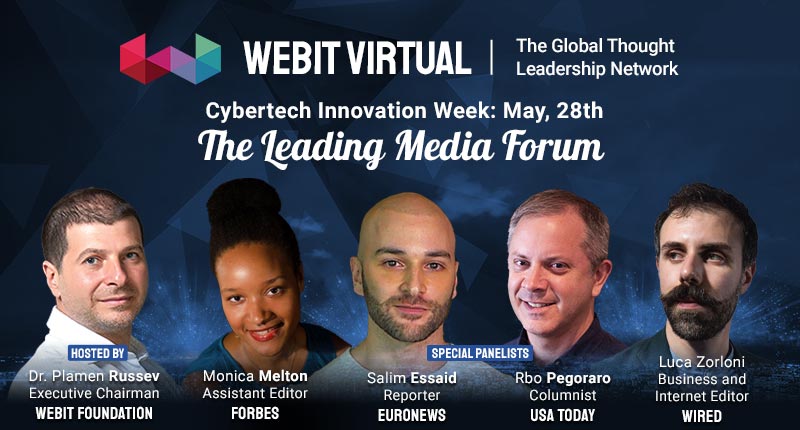
Have you missed the previous Webit Virtual events? The time capsule of Webit Virtual is still open and free to access. 👉 You may watch the past 16 events and programs here. Speakers include: - Legendary investor, Tim Draper - the Father of Internet, Dr. Vint Cerf - The Bitcoin Jesus, Roger Ver - Guy Kawasaki - the founder of Siri, Adam Cheyer; - CEOs, CTOs, CMOs, CxOs of Mastercard, Samsung, SoftBank, McCann WorldGroup, Verizon, AT&T, ... - Ministers, government institutions and senators; - Scientists and representatives from UN, the Atlantic Council, UNESCO, the World Federation of Advertisers and NGOs; - Media, including Business Insider, Washington Post, The Guardian, Fast Company, BBC, Forbes, Al Jazeera, CoinTelegraph; Startup founders who make online pitches and investors who value and vet them live.
Next Week is the Future of Work and Education week with 3 events as part of it. Speakers include: - the founder of Khan Academy - Sal Khan - the Godmother of the Silicon Valley, Esther Wojcicki - journalists from Fast Company, CNN, BuzzFeed.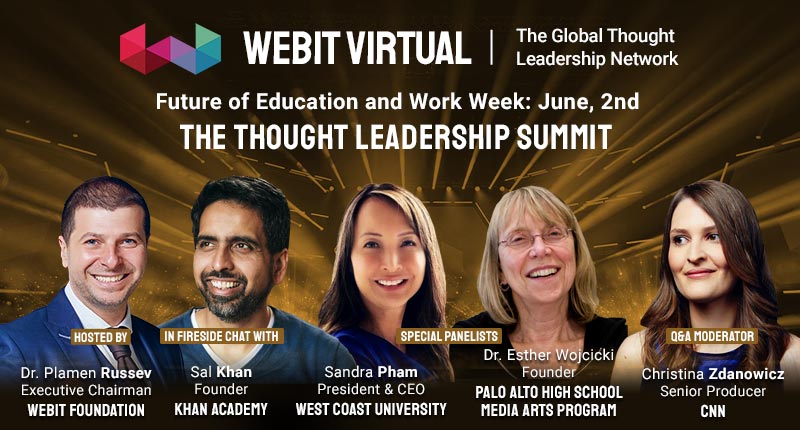
The Week After is the Policy Innovation week with 3 events as part of it. Guest of Honour is the European Commissioner for Innovation, Research, Education, Culture and Youth of the European Commission, Ms. Mariya Gabriel. Special Guests are: - the European Investment Bank' Vice President and Member of the Managing Committee Ms. Lilyana Pavlova - the Executive Editor of Business Insider, Spriha Srivastava - the The Telegraph & The Independent reporter, Hugo Lowell.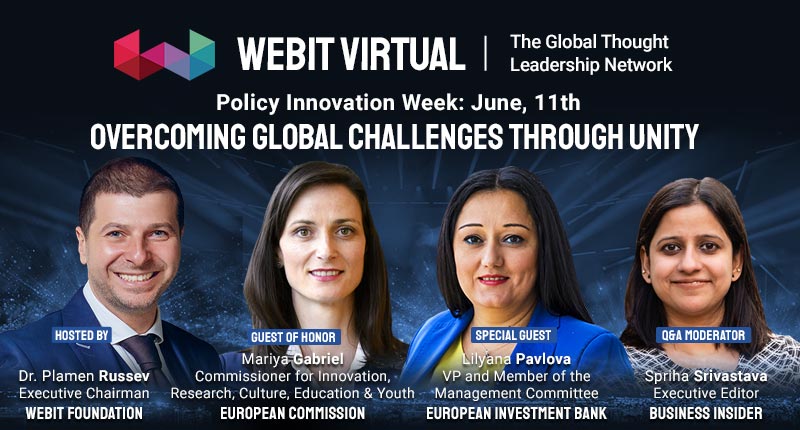 Ping me on @PlamenRussev or LinkedIn so I can ask the question on your behalf during the live program now on Webit Virtual | The Thought Leadership Network.
Webit Virtual is powered by TheVirtual.Show
Ping me on @PlamenRussev or LinkedIn so I can ask the question on your behalf during the live program now on Webit Virtual | The Thought Leadership Network.
Webit Virtual is powered by TheVirtual.Show
 Webit: web site | Linkedin | Facebook | Twitter
Personal: about me | LinkedIn | Twitter
Webit: web site | Linkedin | Facebook | Twitter
Personal: about me | LinkedIn | Twitter
Starts in:
REGISTER FOR LIVE PROGRAM ACCESS
Add to Calendar Google | iCal | Outlook | Yahoo
We shall discuss: - How to prepare for the new reality - How do you make sure that the way your employees working from home do so in a secure manner - What major changes are possible in the architecture of the internet in the coming years - Spam and Phishing and malicious websites / targeted attacks - how to prepare your company and your teamsTomorrow, Webit Virtual SyberTech Week continues with the Leading Media Forum on CyberSecurity. You will hear the voice of leading journalists and their researches and findings. Be aware of what is really going on in the cyber world and in your computer and phone!
UNTIL

REGISTER FOR LIVE PROGRAM ACCESS
Add to Calendar Google | iCal | Outlook | Yahoo
Have you missed the previous Webit Virtual events? The time capsule of Webit Virtual is still open and free to access. 👉 You may watch the past 16 events and programs here. Speakers include: - Legendary investor, Tim Draper - the Father of Internet, Dr. Vint Cerf - The Bitcoin Jesus, Roger Ver - Guy Kawasaki - the founder of Siri, Adam Cheyer; - CEOs, CTOs, CMOs, CxOs of Mastercard, Samsung, SoftBank, McCann WorldGroup, Verizon, AT&T, ... - Ministers, government institutions and senators; - Scientists and representatives from UN, the Atlantic Council, UNESCO, the World Federation of Advertisers and NGOs; - Media, including Business Insider, Washington Post, The Guardian, Fast Company, BBC, Forbes, Al Jazeera, CoinTelegraph; Startup founders who make online pitches and investors who value and vet them live.
Check the upcoming Themed Weeks until August 2020 and join as speaker or Webit Virtual partner.
REGISTER FOR LIVE PROGRAM ACCESS
Next Week is the Future of Work and Education week with 3 events as part of it. Speakers include: - the founder of Khan Academy - Sal Khan - the Godmother of the Silicon Valley, Esther Wojcicki - journalists from Fast Company, CNN, BuzzFeed.

The Week After is the Policy Innovation week with 3 events as part of it. Guest of Honour is the European Commissioner for Innovation, Research, Education, Culture and Youth of the European Commission, Ms. Mariya Gabriel. Special Guests are: - the European Investment Bank' Vice President and Member of the Managing Committee Ms. Lilyana Pavlova - the Executive Editor of Business Insider, Spriha Srivastava - the The Telegraph & The Independent reporter, Hugo Lowell.
 Ping me on @PlamenRussev or LinkedIn so I can ask the question on your behalf during the live program now on Webit Virtual | The Thought Leadership Network.
Webit Virtual is powered by TheVirtual.Show
Ping me on @PlamenRussev or LinkedIn so I can ask the question on your behalf during the live program now on Webit Virtual | The Thought Leadership Network.
Webit Virtual is powered by TheVirtual.Show
Best, Dr. Plamen Russev Executive Chairman, Webit Foundation
Goodwill Ambassador for Digital Affairs, Republic of Bulgaria Serial Entrepreneur / Investor www.russev.com | www.webit.org
 Webit: web site | Linkedin | Facebook | Twitter
Personal: about me | LinkedIn | Twitter
Webit: web site | Linkedin | Facebook | Twitter
Personal: about me | LinkedIn | Twitter Evolution is key
The Leading Media Forum at Webit Virtual Brand Innovation week hosted by Dr. Plamen Russev on 21 May with over 9 thousand simultaneous live virtual attendees and hundred of thousands views afterwards.
During the Leading media forum on 21.05 at Webit Virtual’ Brand Innovation Week we met with four of our special guests, invited not only as writers at leading editions such as Forbes, Inc. Magazine and USA Today, but also as experts with more colourful experience and business background, as well as bestselling authors, influencers and thought leaders to speak about the latest tendences in the business world and the “Brand evolution in times of a global crisis”. The discussion was opened by Karen, who presented an overview of the dramatically shifting landscape of media, caused by COVID-19. The scene is now much more focused on substance, rather than flash.This is what Webit and particularly the Virtual Webit events are actually providing and this is what our whole team believes in. Collective intelligence, as called by Rhett Power referring to the organizations and companies who are open to listen to their employees when they are looking for new solutions and decisions, is what we are actually doing at Webit: not only within our own team but we do it as a Global Network and Platform where we invite global thought leaders in particular sectors to share their knowledge and we provide that valuable content to our audience.
What we learned from the invited guests during the Leading Media Forum on 21 May? We all know that everything is changing now and Covid is changing society in different levels and this is going to happen no matter what. The question is how you as a business, as a manager will respond to that change? Anglela made a deep dive into the Italian Ecosystem with the luxury brands like Gucci, Armani, Prada who had the facilities and they made a strategic move and decided to manufacture medical overalls, face masks instead of staying and not doing anything for months, Ferrari who started making ventilators.
- We all know that disruption is a term that’s usually used in the marketing and business world, but we live now in a world that is already totally disrupted so what we need now is to adapt.- said Angela- Evolution is key now.
- Right now your reputation online is your reputation. - said Karen - No one has the luxury not to look good online any more. Everyone needs to have their personal brand, their CEO brand and their business brand really in top shape. The messaging has to be clear, the visuals have to be clear, it has to be clearly represented online so people can see who you are, what you stand for and what you offer. Pre-COVID we lived in an "or" world. There was live, or virtual. We had live events, virtual events, live businesses, virtual businesses. And virtual was kind of considered the step-child of life. One of the huge changes out of COVID is, we're going to live in an "and" world. End evey live event will have a virtual equivalent. That digital transformation will open up a whole world of possibilities for people personally and for people in business. And it is not just the technology and to learn how to use it but also it is about how we communicate with other people and perform better online, if experts learn how to look online, that will exemplify their credibility and their influence.
- The change you are going to make, when you pivot online, when you add the digital to your brand is a pivot that has to be authentic to your brand. - advised Steven - It is not easy to pivot your business in 5 weeks and still be authentic but you have to do it. Otherwise you will lose your audience. You have to become a digital leader and to be a trim tab - an example of that small thing can make a big difference and change the direction of all.
- Go back to day 1, think about your business as it was in the beginning and as it was in the first stage of that business and you have to figure out how to make it work all over again.- said Rhett in the end of the discussion concluding the strong message that all participants gave to the audience: if you restart and reinvent yourself, if you don’t stop learning, adapting and evolving the changes and the challenges will become new doors and opportunities both for your business and for you personally.
Tesla will build the world’s largest lithium-ion battery in South Australia
Tesla, together with the French renewable energy provider Neoen and the South Australian government will install the world’s largest lithium-ion battery to ensure energy security for South Australia in the future.
The future of the energy industry is defined by renewable energy sources and energy storage technologies. The shift towards cleaner and more sustainable alternatives enables energy storage systems to become more largely used. They store the renewable energy which can be then used during peak hours to prevent blackouts.
The lithium-ion battery storage is expected to continue to dominate the market as well as to be a leader with regards to the increase of demand and the decrease of costs. This market position is a result of battery systems which meet the needs of the fastest growing utilities sector. Research shows that in 2017 around 76 percent of the energy storage market will account for utilities.
Tesla will provide a 100 MW/129 MWh Powerpack system which will store the energy produced by Neoen’s Hornsdale Wind Farm situated near Jamestown, South Australia. Last September, a storm caused blackout which affected the entire state of South Australia and left 1.7 million people without electricity. Tesla Powerpack aims to use the stored renewable energy from the wind farm to solve and prevent power shortages.
By delivering electricity during the peak hours this grid scale energy storage project will improve the reliability of the electrical infrastructure in South Australia. The system is expected to be completed by December 2017. It will be the largest lithium-ion battery storage project worldwide which will be able to provide electricity to more than 30,000 homes.
“The system will be three times more powerful than any system on Earth. This is not a minor foray into the frontier. This is going three times further than anyone has gone before.”, Elon Musk said.This project aims to ensure energy security for the people of South Australia. It empowers the state to take the lead on its energy future, but it also sets an example by making a step forward towards the adoption of sustainable energy around the world. The global COO of Neoen Romain Desrousseaux shared that this project is the right way to introduce sustainable and reliable energy that is cheap to the residents of South Australia. By generating around 1,050,000 MWh of renewable electricity annually, the wind farm is the largest renewable energy generator in South Australia.
“We are creating dispatchable, renewable energy that is the cheapest source of energy in Australia and most places in the world.”, Desrousseaux said.If you are interested in the latest trends in Sustainable Energy, then Webit.Festival Europe is the right place for you. During the Smart Cities Summit, you can listen to top level speakers such as the following who attended Webit before: the Strategist Energy Transition at Alliander Manon Jutte, the Interim Head of Urban Living and Built Environment Mike Pitts who led on embedding sustainability across Innovate UK’s strategy and programmes and the Vice President and Chief Technology Officer for EMEA at VMware Joe Baguley. Here you can get more information about Webit.Festival, while here you can get all the information you need about the tickets for the event.
Huge opportunities for investors and entrepreneurs in the Space Industry
Currently, the global infrastructure is expanding into Space. The truth is, this is something that has already started happening. The commercial activity in Space creates many opportunities for both investors and entrepreneurs. It is expected to exceed government activity by 2020.
At the 2017 edition of Webit.Festival Europe the Chairman of Space Angels Network Joe Landon talked about the entrepreneurial revolution in Space. Space Angels is a company which searches the world for the best space startups. It aims to create opportunities for the investors while enabling them to make profit from the commercial space industry.
No matter what the industry is, new technology is always considered crazy at first. The Space was once considered science fiction, now it is a science fact. To make the topic more tangible, Joe Landon shared a couple of examples of innovations in the Space industry with the audience at Webit.
The Falcon-9 Rocket was launched, landed and re-launched by SpaceX. Such reusable rockets spread the costs over the multiple launches and present a revolution in the Space industry. The Blue Origin - the space company of Jeff Bezos, the CEO of Amazon, had a similar success with its New Shepard suborbital rocket. It was launched and landed five times in a year.
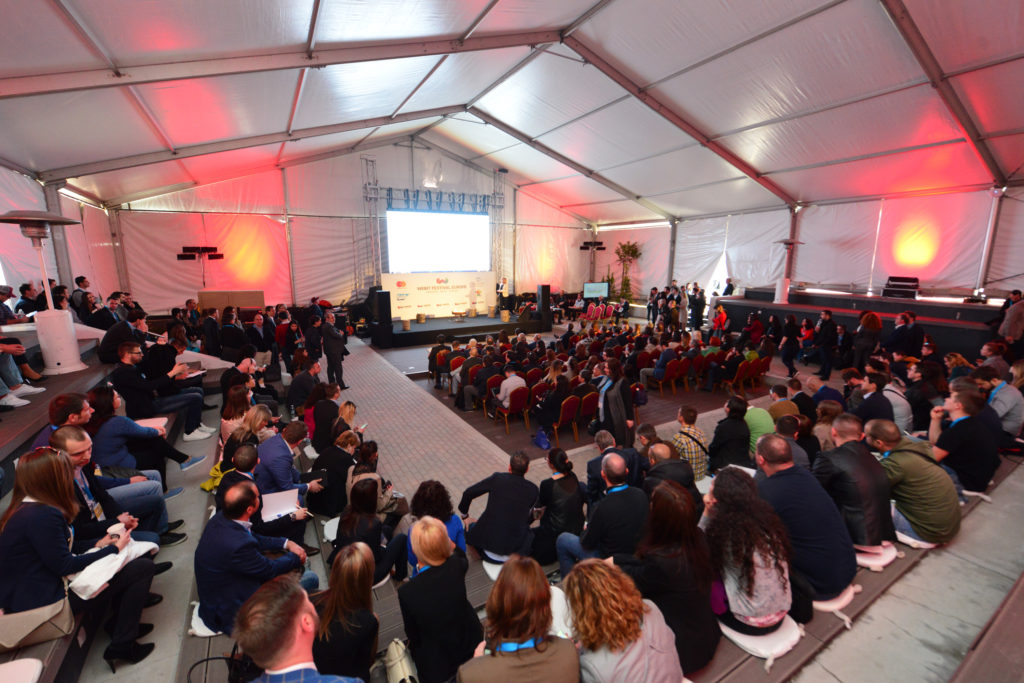 There are many forces which when acting together make Space innovations possible. Joe Landon stressed on the importance of the development in technology which reduces the costs of sending things to the Space. He emphasized on the role of the revolution in satellite technology.
Commercial communication satellites a couple of years back were very heavy and extremely expensive to make and launch. It was important for these satellites to last for 15 years and to be very reliable which required further financing.
The satellites from today can be held in a person’s hand and are far cheaper to produce and launch than their multi-million spacecraft predecessor. It is possible to launch dozens of them at the same time. This technology has a great impact on the space economy. Huge opportunities for investors and entrepreneurs arise.
There are many forces which when acting together make Space innovations possible. Joe Landon stressed on the importance of the development in technology which reduces the costs of sending things to the Space. He emphasized on the role of the revolution in satellite technology.
Commercial communication satellites a couple of years back were very heavy and extremely expensive to make and launch. It was important for these satellites to last for 15 years and to be very reliable which required further financing.
The satellites from today can be held in a person’s hand and are far cheaper to produce and launch than their multi-million spacecraft predecessor. It is possible to launch dozens of them at the same time. This technology has a great impact on the space economy. Huge opportunities for investors and entrepreneurs arise.
“Reusability in Space is very important.”, Landon said.There are innovations concerning 3D printing in Space. The company Made-in Space created a zero gravity 3D printer which enables the astronauts to print the exact tool they need in Space which lowers the costs. 3D Systems is a company which created the first manufactured object from asteroid material. The European banking center created $227 million fund to invest in space mining projects. According to a research report on the opportunities in the commercial space economy by Goldman Sachs, the costs of asteroid mining are comparable to these in Earth mines.
 There are many forces which when acting together make Space innovations possible. Joe Landon stressed on the importance of the development in technology which reduces the costs of sending things to the Space. He emphasized on the role of the revolution in satellite technology.
Commercial communication satellites a couple of years back were very heavy and extremely expensive to make and launch. It was important for these satellites to last for 15 years and to be very reliable which required further financing.
The satellites from today can be held in a person’s hand and are far cheaper to produce and launch than their multi-million spacecraft predecessor. It is possible to launch dozens of them at the same time. This technology has a great impact on the space economy. Huge opportunities for investors and entrepreneurs arise.
There are many forces which when acting together make Space innovations possible. Joe Landon stressed on the importance of the development in technology which reduces the costs of sending things to the Space. He emphasized on the role of the revolution in satellite technology.
Commercial communication satellites a couple of years back were very heavy and extremely expensive to make and launch. It was important for these satellites to last for 15 years and to be very reliable which required further financing.
The satellites from today can be held in a person’s hand and are far cheaper to produce and launch than their multi-million spacecraft predecessor. It is possible to launch dozens of them at the same time. This technology has a great impact on the space economy. Huge opportunities for investors and entrepreneurs arise.
“In ten years satellites will cost 10,000 times less, they will have 1,000 times lower mass and the launch will cost 350 times less.”, Joe Landon said.He dispelled the myth that space companies need extremely big investments in comparison to other tech companies. In fact, the seeds and Series-A investment in space startups is identical to the rest of the tech market. The truth is that space companies from the past needed a lot of funding to build the expensive infrastructure which the space companies of today use. This advantage enables them to develop low-cost, quick businesses. Another myth is that space companies take too long before making any actual profit. The numbers show that since 2009 $14 billion were accounted as exits in the Space industry.
“In the future we’d like to think there are millions of people living and working in the Space.”, Landon said.We are not talking about sending only missions to the Space, but also forming communities. Astronauts will be joined by people with all kind of expertise such as teachers, lawyers and doctors. Today, very few people go to Space. According to Landon in one or two generations there will be people who have lived their entire life only in the Space. This completely different perspective when the Earth is observed from the Space can change the way we think about it. As the Apollo 14 astronaut Edgar Mitchell said:
“You develop an instant global consciousness, a people orientation, an intense dissatisfaction with the state of the world, and a compulsion to do something about it.”You can watch his full lecture here: If you want to keep up with the latest trends in the world of digital economy and technology, then Webit.Festival is the right place for you. Visit our website and book 2 in 1 of our Super Earlybird tickets for Webit.Festival Europe 2018. Feel the Webit vibe with some of the best photos from this year’s event! [easingslider id="4954"]
The need for ethical practices in AI
Nowadays, we have access to two things. First, a big amount of data about our personal information and second - access to AI which enables us to understand far better the insights that make us who we are.
At the 2017 edition of Webit.Festival Europe the President and Global Brand Director of Havas Worldwide Jason Jercinovic, introduced the topic of ethics in the Artificial Intelligence because if this data is in the wrong hands, our privacy could be endangered.
An ethical imperative on how to use this data is necessary to be created. We should consider ethics from the perspective of both consumers and professionals to communicate in an informed way while considering the benefits and the risks which AI brings.
Jason Jercinovic stressed on the development of the tools of today which compared to those of the past can recognize unstructured data. The truth is the world of social media and interconnected devices is one of unstructured data. And these tools enable us to understand the insights from that unstructured data at a scale and to work with them.
[caption id="attachment_5137" align="aligncenter" width="640"]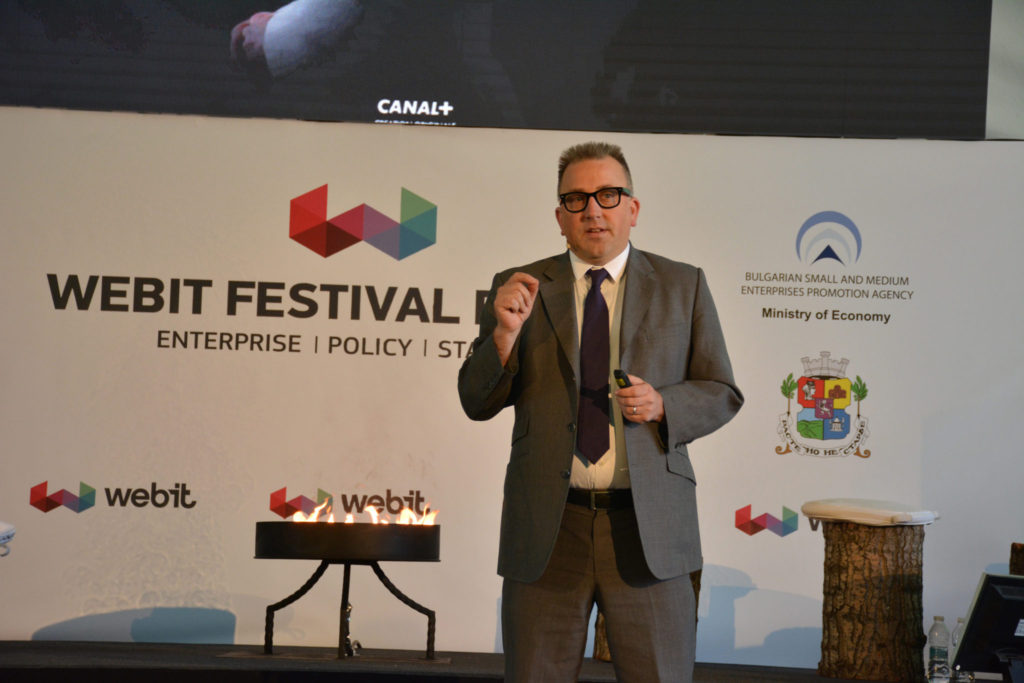 The President and Global Brand Director of Havas Worldwide Jason Jercinovic[/caption]
The vast amount of data enables us to understand people’s behaviour in great detail. Furthermore, it allows us to create and deliver experiences which are extremely efficient since they are targeted to each individual based on personal preferences.
The President and Global Brand Director of Havas Worldwide Jason Jercinovic[/caption]
The vast amount of data enables us to understand people’s behaviour in great detail. Furthermore, it allows us to create and deliver experiences which are extremely efficient since they are targeted to each individual based on personal preferences.
 The President and Global Brand Director of Havas Worldwide Jason Jercinovic[/caption]
The vast amount of data enables us to understand people’s behaviour in great detail. Furthermore, it allows us to create and deliver experiences which are extremely efficient since they are targeted to each individual based on personal preferences.
The President and Global Brand Director of Havas Worldwide Jason Jercinovic[/caption]
The vast amount of data enables us to understand people’s behaviour in great detail. Furthermore, it allows us to create and deliver experiences which are extremely efficient since they are targeted to each individual based on personal preferences.
“With that information I can predict the future. I can influence how you think.”, Jercinovic said.This technology is becoming more complex at a very fast pace. The reality is that companies are willing to use our personal information in order to target their products or services more precisely. Whether we accept this approach as ethical or not will not change the current situation. That is why, we need a code of conduct. At the end of his talk, Jason Jercinovic underlined once again the importance of making a difference between the benefits and the risks AI brings. It is no secret that this technology is used by companies to deliver high quality content and products to us, customers. AI is present in most parts of our live and it is here to make it better. To get a real idea of how AI is implemented in our daily life you can find more about eagleAi, an intelligence platform created by Havas Cognitive for ITV News. It aims to understand how consumers think and it was used during the USA elections. eagleAi processes a huge amount of posts, comments, tweets, news articles, debates and many more to determine what people are talking about and which issues they do find relevant. AiMEN is a cognitive social listening tool created by Havas Cognitive which with the help of AI discovers the posts of people who leave negative comments on the Internet and responds to them with quotes from the Bible. You can watch his full lecture here: If you want to keep up with the latest trends in the world of digital economy and technology, then Webit.Festival is the right place for you. Visit our website and book 2 in 1 of our Super Earlybird tickets for Webit.Festival Europe 2018. Feel the Webit vibe with some of the best photos from this year’s event! [easingslider id="4954"]
There will be 48 billion IoT devices by 2021 and 30%...
Bluetooth technology is developing with steady pace to satisfy customers, said industry veteran Martin Wooley from Webit.Festival Europe 2017 stage. He is Technical Program Manager EMEA for Bluetooth Segway - the standard body behind Bluetooth technology and told us how the company is regularly improving the range and the transfer speed of its devices.
"Back in the 1990’s there were a billion devices connected to the internet. But only 10 years later their number doubled to 2 billion largely thanks to the smartphones. The forecast for 2021 though is staggering. 48 billion devices will be connected to the Internet and 30% of them will be Bluetooth devices. This is not coincidence - Bluetooth has been systematically developed over the years to keep pace with the market requirements and and to enable new things. And it has become a key enable of the Internet of Things (IoT)", Mr Wooley said, when talking about the future of the IoT industry.
He explained how Bluetooth is now heavily used in the medical and fitness industries rather than just being replacement for cable.
"In the beginning Bluetooth was a cable-replacement technology that gave us wireless mice and keyboards and some great audio solutions. Wind the clock forward to 2020 and Bluetooth Low Energy is in pretty much every smartphone and tablet on the planet. It also gave rise to medical devices, health and fitness devices, wearable technology and so on. More recently Bluetooth 5 was released. The headline changes we have made were that we’ve made it twice as fast, we increased the range by a factor of 4 and the capacity of broadcasting data was increased by a factor of 8", the expert said.
He also explained more about the bluetooth beacons used more and more by huge businesses.
"You can use Bluetooth devices in two ways. They can either connect to each other and exchange data over the connection or they can work in a connection-less way, with one device just broadcasting data that any other device can see. Beacons are prime use case for the application of this broadcasting capabilities and the numbers are really interesting. Over the last couple of years we have shifted from companies that are running small pilot projects to rolling out serious deployments of beacons into their businesses and the forecasts are amazing. By 2021 the estimates are that there will be more than 500 million beacons shipped in that one year alone", Mr Wooley expects.
This is how edtech is changing college exams in Japan
Norihisa Wada, the CMO of Tokyo-based Edulab, Inc., an edtech leader with a strong basis in assessment and learning science, took the Webit.Festival Europe 2017 stage by storm to tell us more about the latest innovations in educations in Japan. Mr Wada, who is a former SVP Nintendo, also teaches students in Kyoto University in the field of behavior change.
Meanwhile, EduLab is providing new technology to help for better assessments in education, for example voice and handwriting recognition, which will help for better evaluation of the learners. This will impact the college entrance exams in Japan, starting in 2020.
"In year 2020 the college entrance exams will change. One big change is going from multiple choice questions test to an essay based question items. The second will be the English assessment areas. In Japan the two components were listening and reading, but we are going to add speaking and writing. These are the areas where we provide new technology like the voice recognition and handwritten technology to give a fine assessment of the learners. The national assessment in Japan is multiple choice. This will change into four spectrum assessment. You need to look into your personal characteristics. What are the creativeness you have", the expert said.
He also explained about the nature of the four spectrum assessment:
"First generation is computer based assessment. Second generation is what you call an adaptive learning assessment system. And third generation is what you call a formative assessment, where assessment technology is integrated into the learning process itself. The fourth generation is what you call a four spectrum analysis - assessment of both cognitive and non-cognitive skills".
Mr Wada and his company are also open to investing in startups in the education industry.
"We do a lot of investments today in the field of education technology. My work is connected to meeting new venture startups in the education area in which we could invest in the future. We have outposts throughout the world and these are the trends that we see today in the assessment field of education in Japan", he said.

